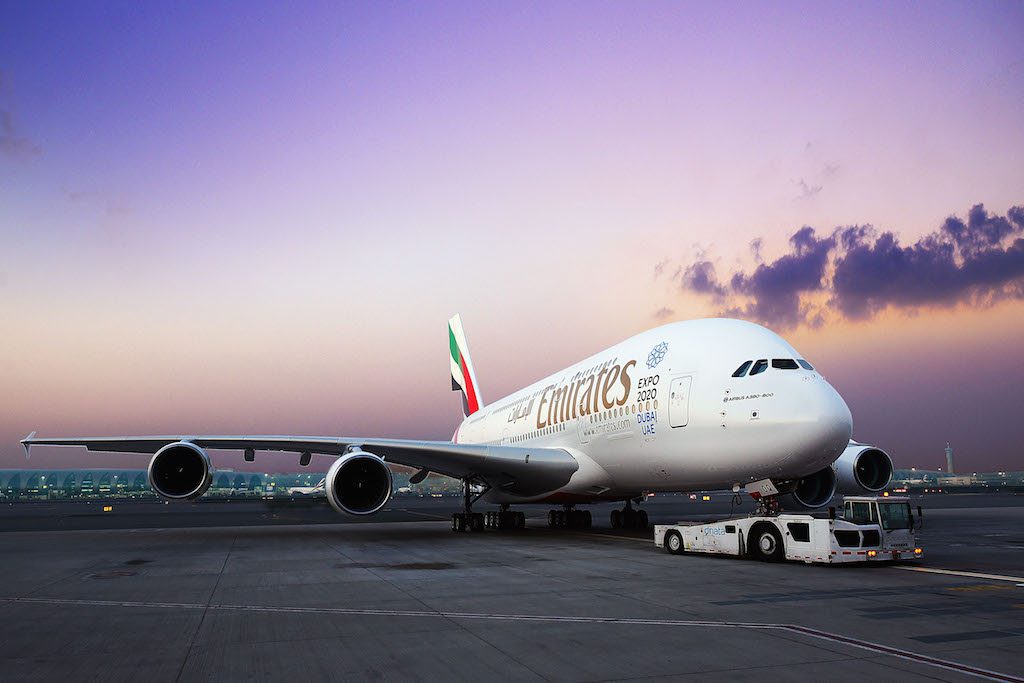Skift Take
The big three Gulf carriers are still very important, but because of a variety of reasons, they're no longer as scary as they were a few years ago. Still, this is good news for U.S. airlines.
Emirates and Etihad Airways will use globally accepted accounting standards for annual reports and open their books to outsiders as part of an agreement negotiated by diplomats from the United States and the United Arab Emirates that could end years of friction over allegations the two Gulf carriers abuse Open Skies agreements.
An airline industry source confirmed the agreement to Skift, saying it should be formally announced Monday. In addition to opening their books, the two Gulf carriers will also pay the “full and fair share” cost of operating from their hub airports in Dubai and Abu Dhabi, the source said. What’s more, the source said, U.S. airlines understand Gulf carriers will not add more nonstop flights between the United States and Europe, though the agreement does not ban them, according to a statement from the embassy of the United Arab Emirates.
News of the agreement was first reported by the Associated Press.
The deal is similar to one reached in January between the United States and Qatar. The three largest U.S. carriers — American Airlines, United Airlines and Delta Air Lines — have long argued Emirates, Etihad and Qatar Airways receive unfair subsidies from their governments. The U.S. carriers say those subsidies violate Open Skies agreements signed by the governments that allow any airline to fly any route between the countries. The Gulf carriers have vigorously denied they receive unfair government assistance.
U.S. airlines have most strongly objected to so-called Fifth Freedom flights, or flights that begin in the Gulf but stop in Europe to pick up fare-paying passengers. Using this permission, which is common in Open Skies agreements, but rarely used by airlines, Emirates has launched nonstop flights from New York JFK to Milan and Newark to Athens. Neither route is so important to U.S. carriers, but they have feared Emirates might add more lucrative city pairs, such as New York to Paris or London.
Technically, AP reported, neither the deal or side letter expressively prohibits Gulf carriers from adding Fifth Freedom routes. But despite public comments from United Arab Emirates’ diplomats, both AP’s report and Skift’s source say there’s an understanding Emirates and Etihad won’t add more U.S.-European routes for the foreseeable future.
“The UAE is very pleased that our understanding with the U.S. preserves all of the benefits of Open Skies for travelers, airlines, communities and aerospace companies in both countries and around the world,” Yousef Al Otaiba, the United Arab Emirates’ ambassador to the United States, said in a statement. “All the terms and provisions of the Air Transport Agreement including Fifth Freedom rights remain fully in place, with UAE and U.S. airlines free to continue to add and adjust routes and services.”
In a statement, Emirates said it pleased discussions have come to an end, but said it has had a “longstanding practice of publicly releasing audited financials in full compliance with international standards.” It also said the two nations made no agreement about future Fifth Freedom flights.
“Contrary to some media reports, there is no freeze on any of the operating rights prescribed in the Air Transport Agreement or any tacit undertakings to do so,” Emirates said in its statement. “The Record of Discussion also makes clear that the UAE and its designated carriers are, and have been at all times in full compliance with the agreement, and that there were never any violations of the agreement by UAE carriers.”
While the news of a settlement is helpful to U.S. carriers, it’s probably not as vital as it might have been three years ago. The three Gulf carriers, while still powerful, are not growing at the rate they once did, and all face significant challenges.
Qatar Airways is hemmed in by a blockade organized by its neighbors, while Etihad is in major cutting mode in part because it lost massive amounts of money investing in other airlines, including Alitalia and now-defunct Air Berlin. Emirates continues to be the strongest of the bunch, but in recent weeks it has cut some flying because of crew shortages, Reuters has reported.
Nonetheless, the trade group representing the major carriers, the Partnership for Open & Fair Skies, cheered the agreement. In a statement it said, “We are extremely pleased that the UAE has finally admitted what we have said all along – its government subsidies harm competition.” Its statement also confirmed U.S. airlines’ belief that the Gulf carriers will not add more Fifth Freedom flights.
The group thanked President Trump for securing the agreement, saying it would protect American workers. It had wanted the Obama administration to negotiate officially with the United Arab Emirates, but the previous administration didn’t make any major advances.
This issues are complicated. Had the United States taken more drastic action, like canceling the Open Skies agreement with the United Arab Emirates, there would have been considerable ramifications on other U.S. businesses.
Federal Express operates a hub in Dubai, and it uses Fifth Freedom rights to shuttle packages worldwide, according to the UAE’s Embassy. Federal Express has long opposed the major U.S. airlines’ campaign to punish Gulf carriers.
Other U.S. interests have sided with Federal Express. JetBlue is an Emirates supporter, and the two airlines codeshare on many routes. JetBlue has said it launched new Detroit-Boston service in part to feed customers to Emirates’ Boston-Dubai route.
The Daily Newsletter
Our daily coverage of the global travel industry. Written by editors and analysts from across Skift’s brands.
Have a confidential tip for Skift? Get in touch
Tags: airline innovation, emirates air, etihad, gulf carriers, open skies, qatar airways
Photo credit: The United States and the United Arab Emirates have solved their dispute over an Open Skies agreement. Pictured is an Emirates Airbus A380. Emirates
